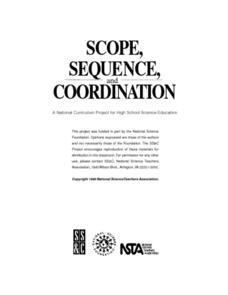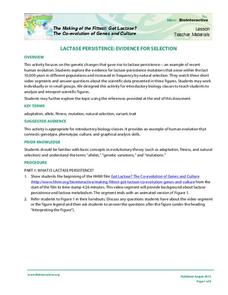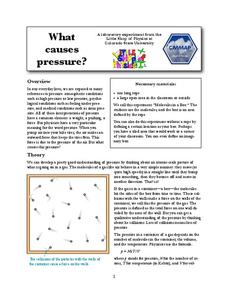Curated OER
Variations in Living Things
Biology beginners observe traits in a collection of plant parts to realize the tremendous amount of genetic variation within a species. They consider rules of nature and discuss what would happen if they changed. They also examine data...
ReadWriteThink
Webcams in the Classroom: Animal Inquiry and Observation
Boost observational skills with an inquiry-based lesson that takes scholars on a virtual field trip. With help from webcams, learners observe animals in a zoo or aquarium. Observations go into a journal and a discussion is held to review...
Howard Hughes Medical Institute
Lactase Persistence: Evidence for Selection
What's the link between lactase persistence and dairy farming? Biology scholars analyze data to find evidence of the connection, then relate this to human adaptation. Working individually and in small groups, learners view short video...
Science Geek
VSEPR and Molecular Geometry
Many chemistry jokes have no reaction. Presentation begins by explaining what models are and the limitations of various forms before introducing the VSEPR model. Then it outlines the rules for creating a VSEPR model and shows examples of...
National Science Teachers Association
Adopt-a-Dino
Earth historians research a specific dinosaur, write a paper about the Mesozoic era that it lived in, create an artistic rendition of the environment, and give a presentation in class about what they learned. Be aware that there are...
Curated OER
DC Generator Theory
In this online worksheet students answer a series of 14 essay or short answer questions explaining the DC generator theory. The correct answer is available to check their responses to each question. The questions vary in...
Curated OER
African Americans in Science
Students explore the careers of prominent African Americans in science, mathematics, and technology. They use The Faces of Science: African Americans in the Sciences website, which includes profiles of past and present African Americans...
Curated OER
The Basics of Earth Science
Students discuss and define the term "scientific theory." They work in small groups to draft an overview of one theory including details about the theory's evidence and significance.
Curated OER
Darwin's Principles
The author invested plenty of time in the presentation of this information; it is visually appealing, contains sound-effects, and displays creative animations and photos! Unfortunately, blank lines are included on most of the slides with...
Towson University
Mystery Tubes
How do scientists know they're right? Truth be told, they don't always know. Explore the scientific process using mystery tubes in an insightful activity. Young scientists discover how to approach and solve problems in science, how ideas...
NASA
Discovering the Milky Way
What do you call a tiny collection of galaxies? A puny-verse! Young scholars graph data gathered by scientists studying Cepheids. They attempt to identify a relationship between the variables through standard and logarithmical...
Colorado State University
How Can I Turn a Solar Oven into a Refrigerator?
Whether you want to heat things up in science class or cool things down a bit, an intriguing lab's got you covered! Science scholars explore the principles of thermodynamics using a solar oven, then change the conditions to turn their...
United Nations
Compost Monitor Training
What should go in the trash, and what can be composted? Guide your young conservationists through the process of composing their trash with a lesson about the different ways we can dispose of garbage. Using a trash bag with clean...
Colorado State University
Can Boiling Make Something Freeze?
Use boiling as an avenue for freezing. Young scholars watch as liquid nitrogen removes heat from the ingredients for ice cream. As this happens, the nitrogen boils and the ice cream freezes—all in the same container. A little science magic!
American Chemical Society
Joseph Priestley, Discoverer of Oxygen
Do you want to hear a joke about nitrogen and oxygen? NO. We all know there is oxygen in the air and that plants produce oxygen, but how was it discovered? Scholars read a handout, answer questions, and analyze material in the...
Colorado State University
What Causes Pressure?
Are you feeling the pressure? Let loose a little with a kinesthetic activity that models molecular motion in a closed space! The activity varies conditions such as volume and temperature and examines the effects on molecules.
Colorado State University
If You Can't Predict the Weather, How Can You Predict the Climate?
Why is the weather man wrong so often? Young climatologists discover how chaos rules both weather and climate through a math-based activity. Using an iterative equation, the class examines how small day-to-day weather events total up to...
Colorado State University
Can it Really Rain Fish and Frogs?
You've heard of it raining cats and dogs ... but what about fish and frogs? It turns out, one scenario is much more likely than the other! Intrepid weather investigators examine the curious behavior of waterspouts using a leaf blower,...
Curated OER
You Have All the Answers
Students explore the concept of theories in science while examining the theory of evolution. They conduct research and participate in a discussion about current issues in science culminating in the creation of question and answer pamphlets.
Curated OER
Nebular Theory-Origin of the Solar System
In this Nebular Theory learning exercise, students are given diagrams of the stages that occurred in the formation of the solar system. They order the diagrams based on the occurrences of each event and answer twelve questions about the...
Curated OER
Transition State Theory
In this transition state theory worksheet, learners read about chemical reactions and the theory for how chemical reactions proceed. They answer questions about the activated complex, the activation energy and the collision theory all...
Curated OER
Rocket Science
Students conduct an experiment. In this physical science instructional activity, students learn about Isaac Newton's theory that for every action there is an equal but opposite reaction. Students show this theory by looking at how a...
Curated OER
WS 5.2 Kinetic Theory-Temperature and Volume
In this kinetic theory worksheet, learners are given fifteen questions about gases and their kinetic energy, how temperature effects kinetic energy, and the results of changing conditions of gases on the kinetic energy. They convert from...
Curated OER
WHAT MAKES A LIGHT BULB LIGHT?
Students are able to use inquiry to answer the essential questions. They are able to predict and test configurations of a battery, bulb, and wire that make the complete circuit. Students craft a group and individual theory of a...























